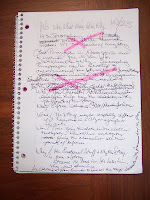 Women, then, have not had a dog's chance of writing poetry. That is why I have laid so much stress on money and a room of one's own. ~ Virginia Woolf, A Room of One's Own
Women, then, have not had a dog's chance of writing poetry. That is why I have laid so much stress on money and a room of one's own. ~ Virginia Woolf, A Room of One's Own Most writers require time and space to create their project; book, story or poem. This place is their creative or writing zone. As writers, we need to protect our space fervently, zealously and continually.
Where is your zone?
Thank you to the organizers of A-Z Challenge, this has been a wonderful exercise. Thank you to everyone who read this blog, and a bigger thank you to everyone who took the time to comment. I appreciate every note.




















